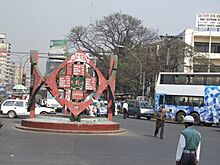Noor Hossain facts for kids
Quick facts for kids
Noor Hossain
|
|
|---|---|
| নূর হোসেন | |

Hossain wearing the words "Let tyranny die!" at a protest for democracy, minutes before his death. Photographed by Dinu Alam.
|
|
| Born | 1961 East Pakistan
|
| Died | November 10, 1987 (aged 26) Dhaka, Bangladesh
|
| Cause of death | Shot by firearms by the Bangladesh Police |
| Resting place | Jurain, Dhaka |
| Monuments | Noor Hossain Square (formerly Zero Point) |
| Nationality | Bangladeshi |
| Known for | Being a symbol of opposition against Ershad's government and later as a symbol for the democracy movement in Bangladesh |
| Political party | Awami Jubo League |
| Parent(s) | Mujibur Rahman (father) Marium Bibi (mother) |
| Relatives | Ali Hossain (brother), Delwar Hossain (brother) |
Noor Hossain (born 1961 – died November 10, 1987) was a young activist from Bangladesh. He became a symbol for democracy after he was killed during a protest in Dhaka on November 10, 1987. He was protesting against the government of President Hussain Muhammad Ershad. The place where he died, Zero Point, was later renamed Noor Hossain Square. Each year, November 10 is remembered as Shohid Noor Hossain Day to honor him. He is known as one of the most important heroes of Bangladesh's movement for democracy.
Contents
Noor Hossain's Early Life
Noor Hossain's family came from a village called Jhatibunia. This village is in the Pirojpur District of Bangladesh. His father, Mujibur Rahman, worked as an autorickshaw driver.
Moving to Dhaka
After the Bangladesh Liberation War in 1971, Noor's family moved to Dhaka. They lived on Banagram Road. Noor went to Radhasundari Primary School, which was also on Banagram Road.
Leaving School and Politics
Noor Hossain had to leave school when he was in 8th grade. This was because his family was very poor. He then went to a driving school to learn how to drive, just like his father. Noor was interested in politics. He joined the Banagram unit of the Joubo League and became its publicity secretary. Even though he wasn't rich or highly educated, Noor Hossain represented the struggles of everyday people. He became a public symbol for their fight.
The Dhaka Siege Protest
On November 10, 1987, many political groups came together. They planned a big protest called the "Dhaka Siege" or "Dhaka Blockade." Their main goal was to demand an end to the rule of President Hussain Muhammad Ershad.
Why People Protested
President Ershad had been in power since 1982 after taking control in a coup d'état (a sudden takeover of the government). He won an election in October 1987, but many people believed the election was unfair. Major political parties like the Awami League and Bangladesh National Party joined forces against his government. They wanted a new election for the Jatiya Sangsad (National Assembly) to be held by a neutral government.
The Protest Turns Violent
The protest rally on November 10, 1987, became violent. Several leaders and protesters, including Noor Hossain, were killed. Many hundreds of people were also hurt. Noor Hossain was one of three members of the Jubo League who died that day. After these deaths, the opposition groups called for a nationwide protest strike on November 11 and 12.
Noor Hossain's Message
Noor Hossain is remembered for the powerful message he carried on his body. Before he was shot, he had slogans painted in white on his skin. On his chest, it said "Down with autocracy" (Sairachar nipat jak). On his back, it said "Let Democracy Be Free" (Ganatantra mukti pak). His death made more people aware of the strong feelings against Ershad's government.
Aftermath and Legacy
President Ershad was removed from power on December 6, 1990. This happened because of the huge public movement that grew after the Dhaka Siege. After Ershad left office, Khaleda Zia became Bangladesh's first female prime minister. A year later, the government made November 10 an official day of remembrance. It was first called "Historic November 10 observance," but the Awami League supported the name "Noor Hossain Day," which it is known as today.
Ershad later apologized for Noor Hossain's death. His political party, the Jatiya Party, also remembers the day but calls it "Democracy Day." Noor Hossain and the square named after him remained important for protesters even after Ershad left office.
Gallery
See also
 In Spanish: Nur Hossain para niños
In Spanish: Nur Hossain para niños
 | Kyle Baker |
 | Joseph Yoakum |
 | Laura Wheeler Waring |
 | Henry Ossawa Tanner |







